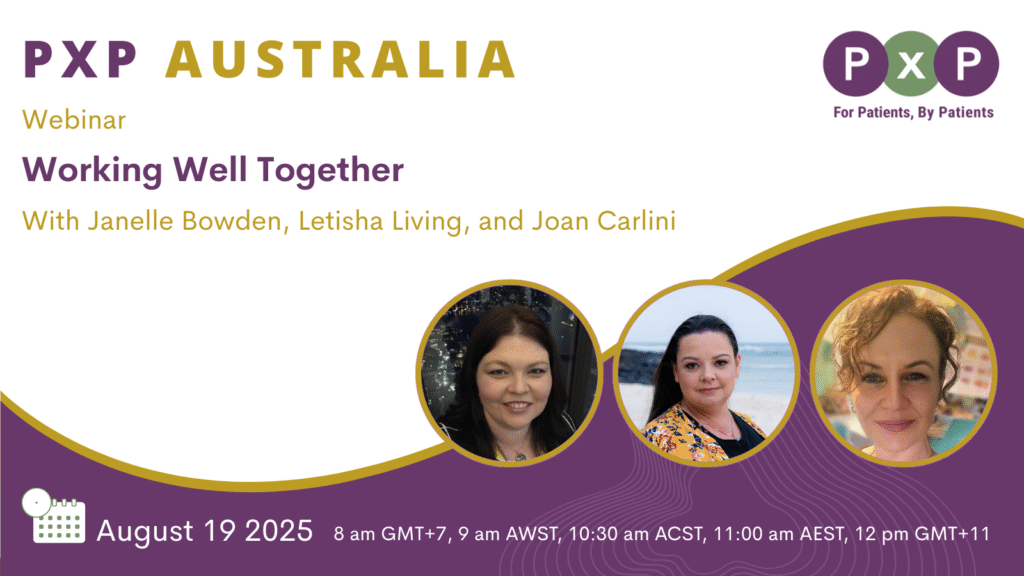The first ever PxP Australia took place on August 19, 2025 and it focused on consumer involvement in research. Consumer is a term used in Australia could be synonymous with language such as patient partner or person with lived experience.
Participants attended the webinar and engaged in conversations through the online chat feature. The main points of conversation are summarized here, along with example quotes that have been anonymized. At the bottom of this page is a list of resources that were shared by webinar attendees.
- Consumers had discussions around the lack of institutional processes to support consumer involvement. One participant shared that their experience of consumers in health spaces is less than ideal as they “are expected to not express [their] ideas” or their ideas are found to “not be acknowledged in meetings”. This is a greater reflection of the exclusionary strategies that are utilised against them. This dismisses the suffering and learnt wisdom from the pain and anguish consumers experience. Being “ghosted” (ghosted is when a person does not receive any communication at all from someone) by researchers is another way in which consumers are dismissed.
“Would agree that the institutional processes to support consumer involvement are usually not well developed, and actually hinder rather than facilitate it”
- A lack of accessibility was mentioned as another way in which consumers may be denied access to research spaces. A participant mentioned that consumers often don’t have technological access in the same ways an institute such as a university does. This also speaks to the greater issue of conflicting needs between researchers and consumers.
“Thanks for highlighting the conflicting needs between researchers and patient partners. And we need to collectively work on equitably addressing these through our global PxP community”
“A constant barrier is the (aham) quality of home office resources compared to the elite academic researcher using university level resources, while we use a laptop held together by sticky tape, fold back clips and propped up with a pile of old books…and a patients "office" may have no printer, few resources or conducted from a public library or internet cafe where we pay by 10 minute blocks for internet access”
- There was also mention of how international conferences often are challenging for Australians and other communities because of time zone fatigue.
- Discussions around access to open-source research took place and resources were shared to make research more accessible to non-academics.
Toutes les ressources:
- PxP Australia: https://pxphub.org/event/pxp-australia-2025/
- PxP India: https://pxphub.org/event/pxp-india-2025/
- PxP Global Conference: https://pxphub.org/event/program/
- A paper titled “From participants to partners: advancing consumer involvement in transformative research”: https://www.tandfonline.com/doi/full/10.1080/0267257X.2025.2522929?src=#abstract
- Why Patient Engagement is Actually Grief Work: https://www.linkedin.com/pulse/why-patient-engagement-actually-grief-work-linxi-mytkolli-msc-n76ke/
- Blog titled “Ten Reasons Why Stroke Survivors Should Get Involved in Clinical Trials and Stroke Research”: https://sway.cloud.microsoft/6G2EYoHSPXYd8pNT?ref=Link
- Blog titled “Understand and Recognize the Impact of Inclusion for Stroke Survivors”: https://sway.cloud.microsoft/ZOHYxMD9gMs6ibOH?ref
- Joan Carlini’s papers: https://scholar.google.com.au/citations?hl=en&user=vCOsY7IAAAAJ&view_op=list_works&sortby=pubdate
- Paper titled “From participants to partners: advancing consumer involvement in transformative research”: https://www.tandfonline.com/doi/full/10.1080/0267257X.2025.2522929
- The National Health and Medical Research Council (Public funder of research): https://www.nhmrc.gov.au/

